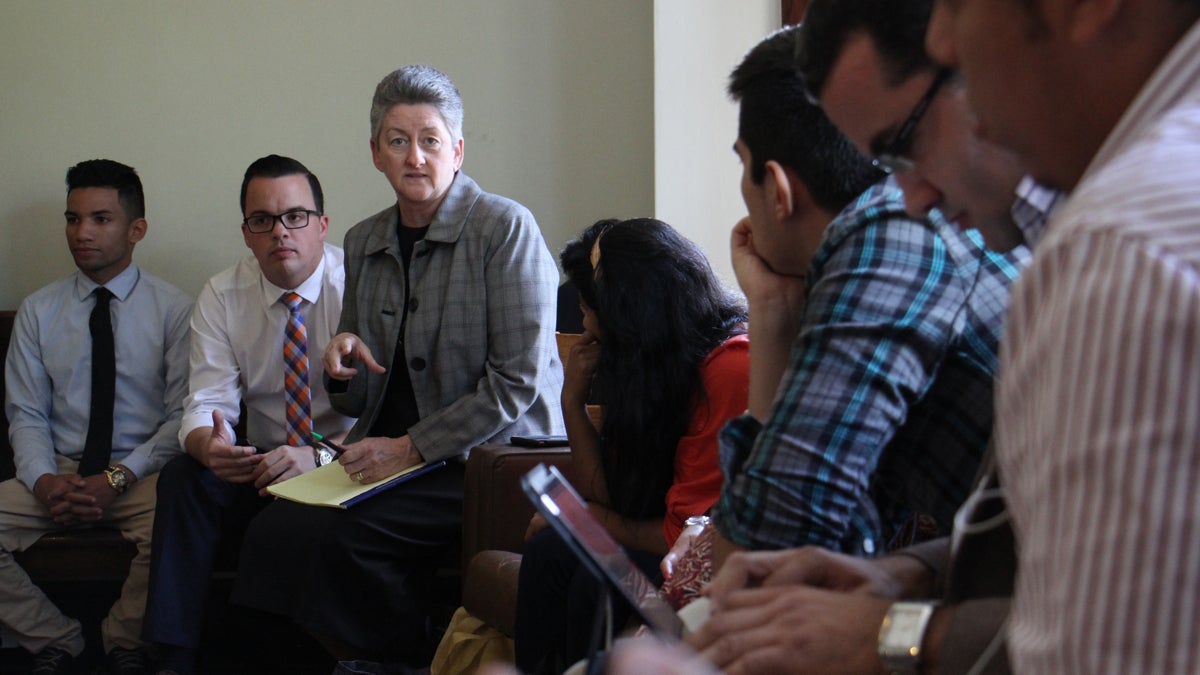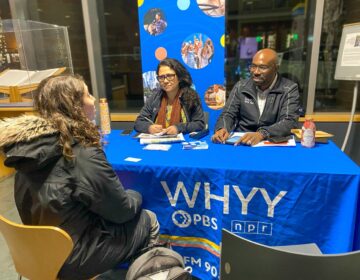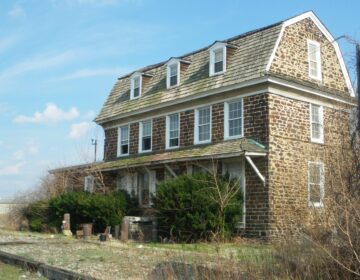Latin American advocates for at-risk youth ask questions, share insights in Camden
Listen
Sister Helen Cole of Guadalupe Family Services in Camden hosts a meeting of gang violence interventionists from South and Central America. (Emma Lee/WHYY)
On Friday, more than a dozen Latin American advocates who work with at-risk youth visited Camden.
What do kids in Latin America have in common with kids in the struggling New Jersey city?
Many of them face the threat of crime, gang violence, and an ever-growing drug trade every day.
That’s why, on Friday, more than a dozen Latin American advocates who work with at-risk youth visited Camden as part of the State Department’s International Visitor Leadership Program, which connects industry leaders from other countries to their counterparts in the U.S.
The meeting, organized by Philadelphia-based Citizen Diplomacy International, was a chance for social workers typically separated by a language barrier and several thousand miles to share insights and ask one another questions.
“You have more resources in the United States to fight this,” said Uruguay resident Laura Voituret, who runs the Providencia Educational Center in Montevideo, through a translator. “But in the end, we are realizing that we are facing exactly the same problems.”
The delegation met with members of Camden-based Guadalupe Family Services and several high-school students who attend a GFS after-school program.
The Latin American advocates said they struggled with persistent violence stemming from the drug trade, ongoing gang activity, and police forces and governments often unable or unwilling to stop crime.
One person asked how programs for at-risk youth in Camden were received by local gangs.
Another wondered how much cocaine a person could carry in the U.S. without facing prison time.
Sister Helen Cole, who runs GFS, said she wanted to stress the importance of safe spaces and education to the Latin American group. “Having a safe place in the midst of violence, being able to do whatever we can to educate and have expectations of being educated — I think that’s so important.”
Cole also praised the efforts of members of the Latin American delegation — teachers, nonprofit directors, and social workers from countries including Mexico, Nicaragua, and the Dominican Republic. “They’re doing just amazing work in terribly poor countries and situations that are much more oppressed than we think we are in Camden,” said Cole.
But several people in the Latin American delegation nonetheless marveled at the resources and cooperation among groups aiming to help at-risk youth in the U.S.
“Communication with the government is very difficult for us,” said Argentinian Silvia Flores, who runs La Juanita Cooperative in La Matanza on the outskirts of Buenos Aires.
“That’s something we are learning here, and I’m sure we can do it once we’re back in our own country, to apply some of the things we have learned here,” she said, through a translator.
The meeting came halfway through a year that has seen a surging murder rate in Camden, which recorded its 24th homicide of 2016 this week when 26-year-old Jahquae Walker was shot dead.
For Aaron Holmes, a Camden teenager who attends technical high school, the news is no surprise.
“There are still murders that happen,” he said. “There were carjackings that used to happen a couple years ago. These were people I knew, too, that lived right up the street from me.”
Holmes attends a GFS after-school program and dreams of becoming a fashion designer.
But first, thanks to his experience in after-school activities and the influence of his mother, Holmes has designs on starting a program in Camden to employ former gang members to help solve disputes among the city’s young people.
“There are still good kids here,” he said, “no matter what.”
WHYY is your source for fact-based, in-depth journalism and information. As a nonprofit organization, we rely on financial support from readers like you. Please give today.




